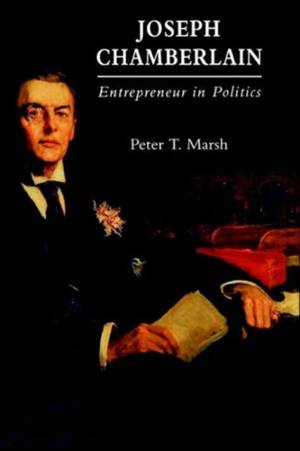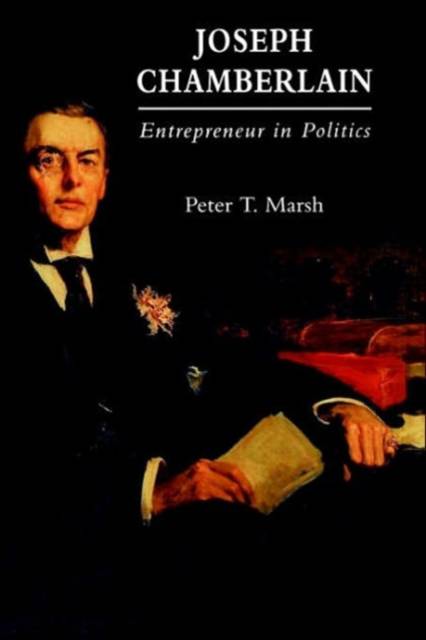
- Afhalen na 1 uur in een winkel met voorraad
- Gratis thuislevering in België vanaf € 30
- Ruim aanbod met 7 miljoen producten
- Afhalen na 1 uur in een winkel met voorraad
- Gratis thuislevering in België vanaf € 30
- Ruim aanbod met 7 miljoen producten
Zoeken
Omschrijving
Joseph Chamberlain (1836-1914) was the first industrialist to reach the highest sphere of British politics. Notably successful as a young man in Birmingham's metal-manufacturing industry, he tackled politics as business--venture by venture, innovative in organization as well as product, alert to the importance of accounting and marketing. Aggressive and direct in both personality and principle, he was loyal to enterprise rather than to party. He never became prime minister, yet by the beginning of the twentieth century he was by general consent "the first minister of the British Empire."
This book by Peter T. Marsh is the first complete, archivally based, single-volume biography of Chamberlain. Skillfully dissecting his political career, Marsh reveals Chamberlain's radically fresh approach to most of Britain's problems between the Second Reform Act and the First World War. He also highlights the distortions and discontinuities: the breach with Gladstone over Irish Home Rule, which drove Chamberlain from the left of the Liberal party into enduring alliance with the Conservative right; how Chamberlain came to be the champion of the House of Lords instead of its scourge; the cause and effects of Chamberlain's shift from free trader to protectionist. In addition, Marsh explains Chamberlain's internationalism, his involvement in South Africa, Canada, and the United States, and his sustained campaign to develop the Empire's "undeveloped estates."
Searching and judicious, the book evokes the contradictions in Chamberlain's personality and private life, his vigor, intensity, and imperious self-confidence along with his inner desolation and lifelong nervous strain. Finely written and argued, the book makes compelling reading, presenting the story of a life that is one of the most absorbing in modern British politics.
This book by Peter T. Marsh is the first complete, archivally based, single-volume biography of Chamberlain. Skillfully dissecting his political career, Marsh reveals Chamberlain's radically fresh approach to most of Britain's problems between the Second Reform Act and the First World War. He also highlights the distortions and discontinuities: the breach with Gladstone over Irish Home Rule, which drove Chamberlain from the left of the Liberal party into enduring alliance with the Conservative right; how Chamberlain came to be the champion of the House of Lords instead of its scourge; the cause and effects of Chamberlain's shift from free trader to protectionist. In addition, Marsh explains Chamberlain's internationalism, his involvement in South Africa, Canada, and the United States, and his sustained campaign to develop the Empire's "undeveloped estates."
Searching and judicious, the book evokes the contradictions in Chamberlain's personality and private life, his vigor, intensity, and imperious self-confidence along with his inner desolation and lifelong nervous strain. Finely written and argued, the book makes compelling reading, presenting the story of a life that is one of the most absorbing in modern British politics.
Specificaties
Betrokkenen
- Auteur(s):
- Uitgeverij:
Inhoud
- Aantal bladzijden:
- 744
- Taal:
- Engels
Eigenschappen
- Productcode (EAN):
- 9780300058017
- Verschijningsdatum:
- 27/07/1994
- Uitvoering:
- Hardcover
- Formaat:
- Genaaid
- Afmetingen:
- 167 mm x 241 mm
- Gewicht:
- 1174 g

Alleen bij Standaard Boekhandel
+ 379 punten op je klantenkaart van Standaard Boekhandel
Beoordelingen
We publiceren alleen reviews die voldoen aan de voorwaarden voor reviews. Bekijk onze voorwaarden voor reviews.








